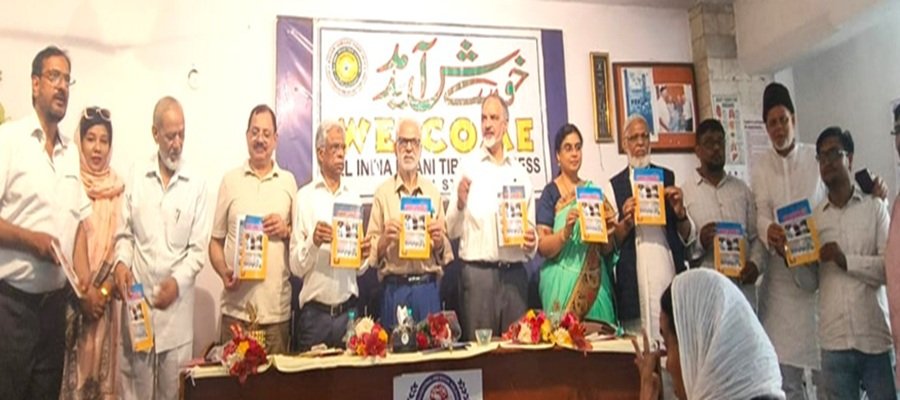AIUTC has played a key role in advocating for the institutional recognition and development of Unani medicine in the country
NEW DELHI — In a renewed push to strengthen the Unani system of medicine in India, the All India Unani Tibbi Congress (AIUTC) convened its National Executive Committee meeting here on Tuesday evening. The session was chaired by Prof Mushtaq Ahmad, National President, and held under the patronage of Dr Syed Farooq Sahib, Chief Patron.
Established in 1989, AIUTC has played a key role in advocating for the institutional recognition and development of Unani medicine in the country. Over the years, it has been instrumental in influencing policy decisions, most notably, persuading the Union government to establish AIIMS-like institutions dedicated to Unani medicine in Bengaluru in Karnataka and Ghaziabad in Uttar Pradesh. This landmark achievement marked a significant step toward integrating Unani with the country’s mainstream healthcare system.
Speaking with Clarion India, Dr Syed Ahamd Khan, Secretary General of the AIUTC, said the organisation has been at the forefront of safeguarding the interests of Unani Tibb in India since its inception. Because of the organisation’s efforts, a separate Unani medicine directorate was established in Uttar Pradesh and Rajasthan and the post of Unani advisor was also de-reserved, he added.
Tuesday’s meeting paid rich tributes to four stalwarts of the Unani fraternity — Prof Mohammad Aslam Khan, Dr Shafiq Ahmad Ansari, Hakeem Maulana Abdur Razzaq Qureshi Qasmi, and Hakeem Shababuddin — whose contributions were hailed as foundational to the discipline’s growth.
Following confirmation of minutes from the previous meeting held in Dehradun in 2024, the committee undertook a comprehensive review of state chapters. Representatives from 25 states presented their reports, outlining local initiatives, practitioner registration drives, seminars, and Unani health camps.

Two long-standing publications — Nawa-i-Tibb-o-Sehat (Allahabad) and Lodhi Risala (Nagpur) — were also released during the session, highlighting the role of medical journalism in the promotion of Unani knowledge.
Among the states, Maharashtra was lauded for its exceptional performance. Due to proactive efforts by its chapter, the state government approved the setting up of its first Government Unani Medical College, complete with land allotment and financial sanction.
Other key developments included the appointment of regular Unani medical officers and the redevelopment of State Tibbiya College, Patna, and the completion of construction at the new Unani Medical College in Bareilly, with the hospital nearing operational status in Uttar Pradesh.
Resumption of the stalled construction of the Unani Medical College at Nuh in Haryana has been undertaken. However, the supply of medicines to dispensaries remains a matter of concern.
The meeting pointed out that the MCD health department continues to have numerous vacancies for Unani Medical Officers in the national capital.
It reiterated the demand to fill three vacant Unani dispensary posts and open more facilities in Himachal Pradesh. It flagged issues in Telangana under the new Clinical Establishment Act and pharmacy licensing.
The meeting sharply criticised the government’s neglect of Unani medicine, especially the long-pending takeover of Tibbiya College in Kolkata and a lack of new dispensaries in West Bengal.
The AIUTC passed several important resolutions during the meeting. The main points of the resolution include:
- Appointment of at least Deputy Director-level officers in the Ayush Directorates of all states and union territories.
- Awareness drives on Ayushman Bharat-PMJAY, NABH accreditation, Jan Aushadhi Stores, and Unani education and training.
- Emphasis on strict quality control and ethical standards in the preparation and distribution of Unani medicines, and
- Expansion of public outreach through free Unani health camps, ABHA registration, and state-level seminars.
Two long-standing publications — Nawa-i-Tibb-o-Sehat (Allahabad) and Lodhi Risala (Nagpur) — were also released during the session, highlighting the role of medical journalism in the promotion of Unani knowledge.
The meeting was attended by over 50 senior scholars, practitioners, and medical educators including Prof Muhammad Idrees, Prof SM Arif Zaidi, and Dr Syed Ahmad Khan, alongside numerous other respected members of the Unani medical fraternity.
The session concluded with a vote of thanks, reaffirming AIUTC’s commitment to advancing Unani medicine through institutional reforms, grassroots initiatives, and constructive policy engagement.

